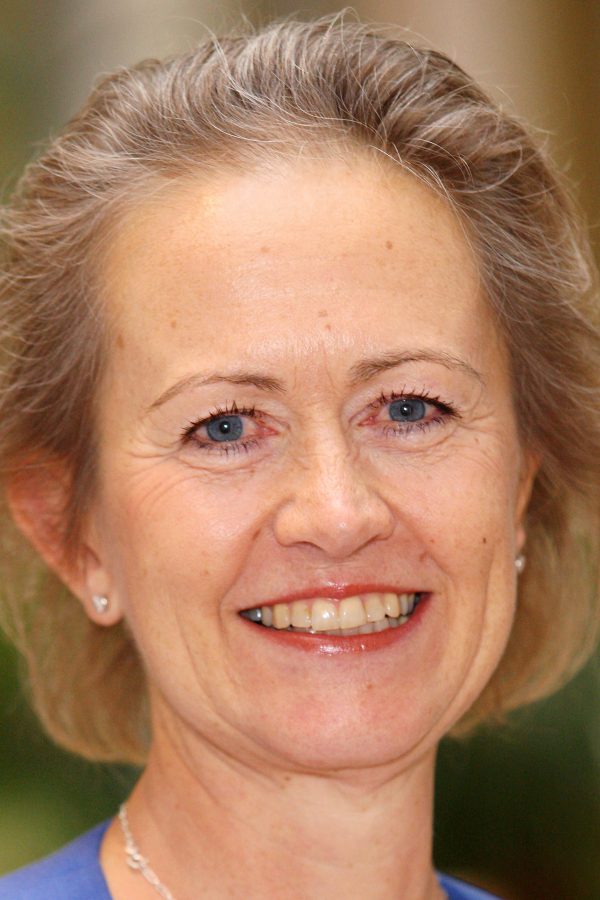
Elizabeth Sparrow is a former president of the British Computer Society (BCS, The Chartered Institute for IT). She is an author and consultant, specialising in outsourcing relationships and change management programmes.
Elizabeth was born in Ealing in west L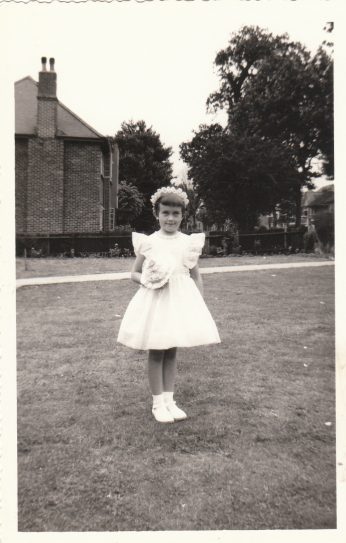
Her family was very actively involved in Pitshanger Methodist Church, and therefore as a child she grew up with a strong social conscience and an awareness of the need to give something back to society.
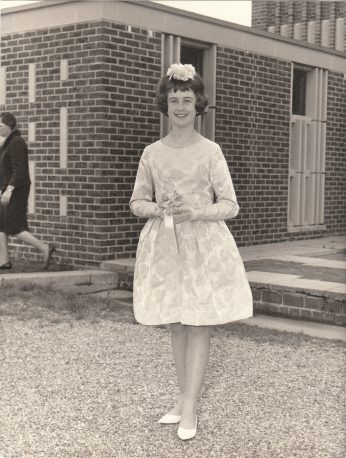
Elizabeth did well at the Eleven Plus getting a scholarship for a free place at her school. The school promoted academic education in particular which suited Elizabeth well. She always chose the subjects she wanted to do and because there were only girls around her, there was never really any question about whether it was a girl’s subject or a boy’s subject. She always enjoyed maths and found it relatively easy. At A Level she did pure and applied maths and physics. She reckons she did her physics exams mostly by picking out the questions that contained lots of maths in them.
She was offered the possibility of trying for Oxford and Cambridge but would have had to spend another year at her school before applying. Elizabeth felt, however, that it was time for her to leave home and find her way in the world so she applied to Southampton University which had a good name for maths. She went to university from 1970 until 1973 and did a BSc Honours course. She did some computing and although she found it quite fun she didn’t particularly take to it at the time.
After her degree she had to think about what she wanted to do to earn money. She discovered an interesting career referred to at that time as information science. She picked a scheme whereby she did one year’s practical work experience at the Science Museum, before doing a master’s degree in Information Studies at Sheffield University.
Having 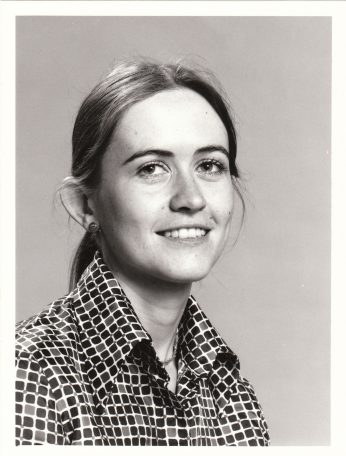
Elizabeth did that job for a couple of years and was then attracted to another opportunity. This was at a time when libraries were beginning to computerise their library catalogues. The British Library was selling services to libraries and she took over a role as a systems analyst in that business. This was her first step into an IT role.
In 1980 she was involved in her first successful IT project. There was an international standard used in library catalogues called the Anglo-American Cataloguing Rules and a major update to those rules was published. The British Library had the challenge of deciding how it was going to convert (or not convert) all the many catalogue records it had to the new standard.
Elizabeth suggested that this process could be computerised. Despite the fact that she was so early in her career, she was given approval to specify the necessary detailed changes and set up a project team to manage the conversion of many different library catalogues. At that stage all computer programs of this scale were run overnight and so, after the conversion programme had run, Elizabeth came in early in the morning, ready to pick up the pieces and sort out the problems, only to be told that the whole thing had run smoothly and had finished in about three or four hours. This outcome gave her a taste for what you could achieve as a project manager. In a later job she also managed BLAISE-LINE, a very early online information retrieval service that the British Library ran in the 1980s.
Elizabeth’s final role at the British Library was Head of Management Information, which was a more general job. But she did feel there weren’t a lot of great further possibilities for her in the organisation and being ambitious she started looking around for other opportunities.
Elizabeth moved on to The Crown Suppliers, a self-financing business within Government that provided all the desks, filing cabinets, clocks, fridges, indeed anything else that was needed by civil servants, embassies, and, most intriguingly, anything used by our spies. She was recruited into The Crown Suppliers finance division to be their representative on a major IT project that was replacing the sales, purchasing and warehousing mainframe system.
While she was doing that job an opportunity came up for promotion and she became Head of the Secretariat of the Board, which gave her a good insight as to what working at board level would be like. This job was not especially onerous and so Elizabeth took the opportunity at this time to get herself a certified diploma in accounting and finance. She also entered and won a management competition, the prize being a grant to take a trip to New Zealand and study privatisation as it was being implemented by the government there. To win she wrote an essay about women in management and the challenges they face. Her thesis was that work was being measured in a very traditional way, and it was time to rethink. She argued that, to encourage more women back to work, a fresh approach was required, which actually defined work to be done by objectives or achievements, rather than the number of hours you worked or when that work was done.
Having done that job for a little while, she got the opportunity to do something which really began to teach her about IT. The Crown Suppliers had a traditional IT department responsible for a big mainframe system. The Government had decided to privatise this organisation and a lot of the skilled and experienced IT people had moved on. As a result Elizabeth got the opportunity on promotion to be the IT director for this organisation. Shortly after her appointment the government decided, having failed to find a buyer, to close the organisation down. Her job then was to close the system and operations down in a well-managed, controlled way. When the closure of The Crown Suppliers was announced, Elizabeth took the opportunity to meet each member of staff on an individual basis to explain to them how options for them personally would pan out during this process. She learnt much from the fact that this gesture was well-received and all these people, who had been dedicated to the organisation, were highly motivated to close it down in a controlled and well-managed way.
Elizabeth next moved to the Home Office as the project manager for a new integrated corporate accounting system called BASS. She had a team of staff, both finance people and IT people and this major new accounting system was implemented on time and within budget.
On the basis of that, she applied for and got promotion to be Head of IT at the Home Office. Elizabeth always describes that as the biggest job in her career. There she was responsible for a multimillion-pound budget, many staff and a big outsourcing contract. There were lots of competing requirements and different challenges. One key concern was an infrastructure upgrade rollout that was suffering from a number of delays and other issues. By the time the rollout was complete it was clear the upgrade would itself be out of date. Elizabeth took grasp of the issues and introduced a completely new approach to upgrading the infrastructure resulting in a migration of two and a half thousand users onto an up-to-date Windows platform in less than six months.
As she came to the end of that infrastructure project she again thought about what she wanted to do next. She was encouraged in the Home Office to move into a more general stream, but decided she actually didn’t want to do that. So she resigned from the Civil Service and in the new millennium she launched a new career.
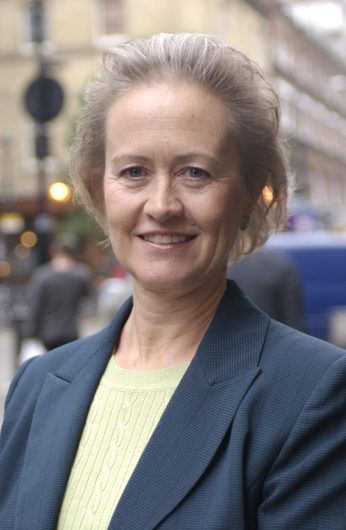
Coming into this new career that Elizabeth was carving out for herself, she wanted to take every opportunity she could to do all sorts of different things. Writing books was something she fancied trying her hand at and in 2003 she wrote her first book, Successful IT Outsourcing, followed a couple of years later by A Guide to Global Sourcing.
Elizabeth joined BCS in the 1990s but had never really had time to volunteer with the organisation until she left full time employment. When she started to just put a toe in the water at BCS she found her work there took off fast and in very interesting ways. She was asked to set up and chair a group looking at offshoring, gathering together some very interesting people with different views and looking at the whole question of how offshoring would impact on the IT profession in the UK. It was very relevant then and of course it’s still relevant today.
Elizabeth held a number of different roles until she was elected first as Vice-President then Deputy President, eventually becoming President in 2009. The Transformation Programme was a major initiative in BCS at that time; consisting of a whole series of projects which aimed to prepare BCS for the twenty-first century and beyond, looking at what being a professional body means in the new millennium. Elizabeth decided to focus her year on some of these changes. She worked on a series of public engagement projects: Information Pioneers, Savvy Citizens, the Information Dividend, and Digital Revolutions. The work was great fun and involved a lot of public speaking and other PR work.
Since leaving full time employment Elizabeth has been very actively involved with various charities. As a Director, she represented BCS on the board at AbilityNet, an organisation that helps individuals with a wide range of disabilities to use computers and access the Internet by adapting and adjusting their technology..
Elizabeth is currently a Director at Healthwatch City of London, the consumer champion for health and social services in the City and trustee at Barts Guild, the Friends of Barts Hospital. She provides both organisations with help and advice on their IT needs.
WaterAid is something Elizabeth is very passionate about and involved in today. She has been a donor for many years and joined their volunteer speaker network when she stepped back from some of her BCS roles. She gives many talks about WaterAid’s work, primarily but not entirely to schools, travelling right across London, and giving anything from fifteen-minute assembly talks to hour-long workshops.
In 2011 Elizabeth joined the Worshipful Company of Information Technologists and is now a Court Liveryman. She was previously a member of the Communications & PR Committee but her particular interest currently is with the work of the charity of which she is a trustee. The WCIT charity combines funds raised with the expertise of members, to provide help to a wide range of small/medium sized charities.
Elizabeth was also a member of the group that set up the Charity IT Association, which is providing consultancy help to small charities that can rarely afford to buy in IT expertise.
Finally, Elizabeth chairs the School of Computing and Communications Industrial Advisory Board within the Open University and has helped to develop its scope and vision.
Elizabeth’s advice to anyone thinking about entering the IT field is “Just do it.”
Don’t let yourself get bogged down because you’ve seen one IT person doing a job you think is a little boring or dull. The scope, the possibilities of what you might achieve are endless. There’s so much variety, so much to be done, so much to be achieved. So just go out and do it.
Her particular advice to any young girl thinking about going into IT is to try not to be put off if you don’t see too many girls because there are lots of opportunities for you. There are many individuals and clubs trying to help girls progress, so that even if you do feel a little alone, and you want some company, there are plenty of organisations you can join up with, and get involved with, where you will find more women around.
Elizabeth has seen quite a few people in her career who have stuck in the same job or the same organisation, despite the fact that they are unhappy, and not making much progress. She doesn’t think it’s been good for them or for the organisation and that you do need to know when to move on.
Elizabeth recommends that if you ever find yourself in a position where your job isn’t taking up your full energies, it’s a great opportunity to do one or two other things such as enhance or add to your qualifications.
One mistake Elizabeth feels she made towards the beginning of her career happened when a new boss arrived. At the time she was very busy with lots of meetings, and she found it difficult to make time to meet her new boss. With hindsight she knows she should have made sure that she actually met with him soon after his arrival however busy she felt at the time. It was several weeks before they actually sat down and talked but by then the damage had been done and eventually Elizabeth had to move on to another job.
At the Home Office, Elizabeth needed to halt one infrastructure upgrade project which was simply proceeding too slowly and had a number of major concerns. If she was doing that today, she thinks she would be able to do that more intelligently. She did speak to people working on the project, but would spend even more time speaking to those involved, hearing their concerns and points of view, even if these did not affect the eventual outcome (which was very successful).
Elizabeth feels the opportunities for IT professionals in the future are limitless, because IT is becoming such an integral part of our lives. There is so much to be done, so many possibilities. She thinks one of the challenges is to recognise and embrace the rapid pace of change in technology. She remembers being somewhat sceptical about whether the PC would ever take off and whether organisations would ever replace the mainframe. Working within an IT environment, it is all too easy to miss developments in consumer technology and to appreciate just how fast things are progressing. We all need to widen our horizons and vision to see how much we could achieve for society by applying IT in an intelligent and well-informed way.
Interviewed by: Jonathan Sinfield on the 4th July 2017 at the London Offices of BCS
Transcribed by: Susan Hutton
Abstracted by: Helen Carter